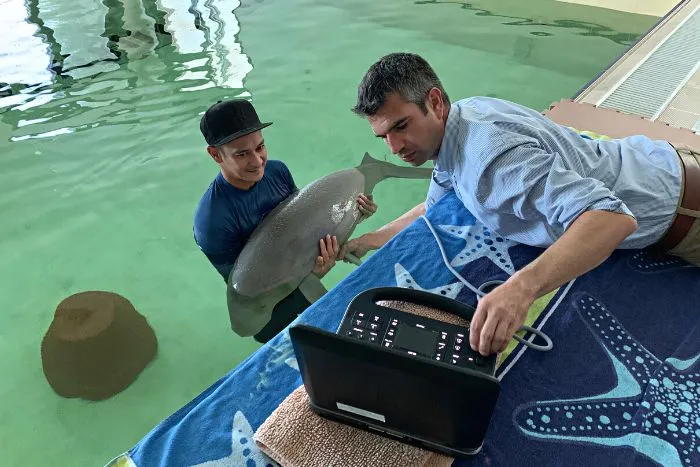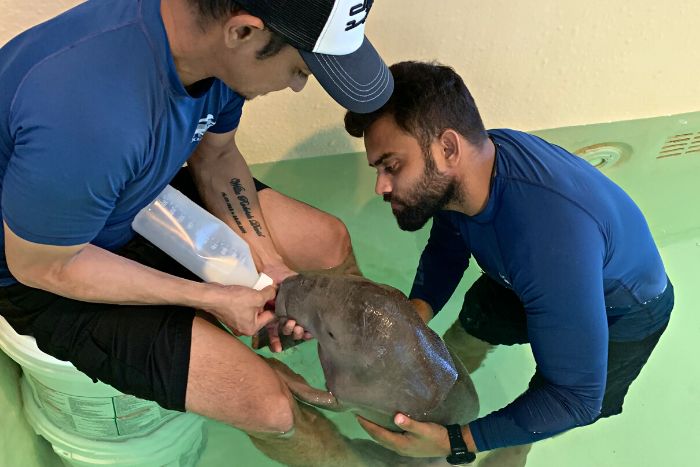This abandoned cutie was rescued and rehabilitated by the Environment Agency Abu Dhabi
Dive into the vast blue waters that surround Abu Dhabi and discover a world of stunning creatures, chief among which is the only sea herbivore, the Dugong.
Folklore has it that these rather cute mammals were once believed to have evolved from mermaids and said to be half-human.
It’s a fanciful tale, but today, thanks to the Environment Agency Abu Dhabi, we bring you a story of one particular dugong that will warm the hearts of everybody.
Meet ‘Malqout’ – an Arabic word that means ‘saved’ and ‘whose owner is not known’, the dugong who, as a young calf, was found alone in the waters of Abu Dhabi.

The tale starts out on a sad note as Malqout was discovered alone, without its mother and far away from any herd. It was thought he was swept away by strong winds and separated from his mum and the herd.
Thankfully, the sad tale has a happy ending when rangers belonging to Environment Agency Abu Dhabi spotted the lone calf at the Marawah Marine Biosphere Reserve.
The Agency’s specialised marine species team quickly assessed Malqout’s health, supported by experts at the Conservation of Migratory Species of Wild Animals (CMS) Regional Office.
Due to Malqout’s weight and unstable condition, the Agency’s team confirmed that he was suffering from dehydration and malnutrition and needed specialised veterinary care.
The decision was made to transfer him to a specialised facility in Abu Dhabi, staffed by animal husbandry experts and qualified veterinarians.
Here, the Agency coordinated with locally based zoological experts, Worldwide Zoo Consultants (WZC) to provide veterinary consultancy and ongoing specialist animal husbandry care.
The specialists advised keeping Malqout under round-the-clock human supervision due to his poor health, supported by the availability of appropriate resources that could provide the highest standards of care.
The successful rescue and rehabilitation process of Malqout is unique and one of the rarest cases in the world.
The Agency succeeded in caring for Malqout even though dugongs do not respond well in captivity, by drawing on its extensive experience garnered over 25 years, which includes several research and scientific studies on dugong protection and preserving habitats and marine species.
Dugongs rely heavily on their mothers for the first 18 months of their life, but the Agency was able to provide the best environment for Malqout to survive.
To rehabilitate Malqout, continuous 24-hour veterinary care was provided until he was gradually weaned and trained to eat seaweed. To maintain his quality of life after that initial period, Malqout needed special care from qualified veterinarians, including suitable facilities to accommodate his growth, and to protect him from volatile weather conditions and loud noises.
The Agency and the team of experts provided a stimulating environment with suitable space in which Malqout could learn about natural behaviour patterns, while ensuring his long-term growth.
The team of experienced veterinarians provided special formula food to treat dehydration and malnutrition. Since then, Malqout has grown from 60 cm to nearly two metres long and has been given a clean bill of health.

The Agency made the decision against releasing Malqout due to itslack of natural survival instinct acquired in the early stages of a dugong’s life – and in order to mitigate any other risks.
Being young and reared in a controlled environment, he has not developed normal immunity and has adapted to receiving specialist human care, which hinders his ability to interact with other species and avoid predators.
The second largest gathering of dugongs
On the incredible rescue of Malqout, Her Excellency Dr. Shaikha Salem Al Dhaheri EAD’s Secretary General said: “Malqout’s story is a story we want to share with the world as it is a unique and rare occasion, as dugongs are fragile animals and rely on their mother during the first two years of their life.
“This made us realise the task ahead, and that Malqout would need around-the-clock monitoring and rearing to ensure his survival.
“During his rehabilitation Malqout has grown profoundly and is doing very well, and his case is a perfect example of how local and international collaboration can help save species around the world, as our team of experts at the Environment Agency – Abu Dhabi worked closely with experts through the CMS office, and Dugong MoU, as well as with specialised marine vets, to ensure that we provide the best care possible.”
There are approximately 3,000 dugongs in the territorial waters of Abu Dhabi, and they are mostly found near Bu Tinah Island, which forms part of the Marawah Biosphere Reserve and Al Yasat Marine Protected Area.
The Agency is responsible for providing protection for the second-largest gathering of dugongs in the world, after Australia. Therefore, EAD is doing everything in its power to ensure the preservation of the dugong population and reduce mortality rates as well as any risks that threaten them thanks to its specialised team, which includes experts and researchers who are well versed in the habits and behaviour of dugongs.
For more stories on the environment, head to Yalla Abu Dhabi

